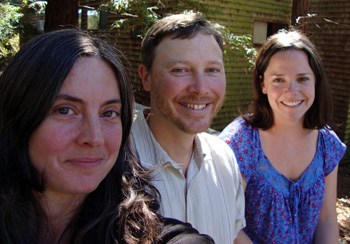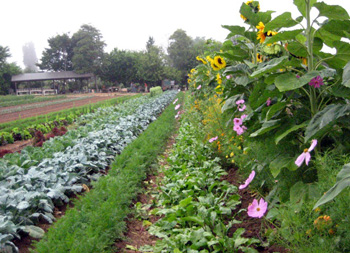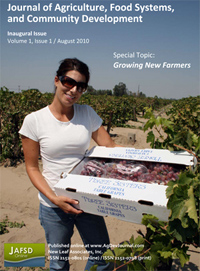Campus News
UCSC farm apprentices create their own jobs in the field
A new study that looks at 20 years of the Apprenticeship in Ecological Horticulture program at UC Santa Cruz finds that a large percentage of its alumni are still involved in growing and marketing organic food and teaching others how to do so.



A new study that looks at 20 years of the Apprenticeship in Ecological Horticulture program at UC Santa Cruz finds that a large percentage of its alumni are still involved in growing and marketing organic food and teaching others how to do so.
The paper “Achieving program goals? An evaluation of two decades of the Apprenticeship in Ecological Horticulture at the University of California, Santa Cruz” is based on surveys of 299 graduates from 1989 through 2008. It is published in the premiere issue of the new online Journal of Agriculture, Food Systems, and Community Development, available for no charge until October.
Lead author Jan Perez, a research specialist with the Center for Agroecology & Sustainable Food Systems (CASFS ) at UCSC, said the survey, one part of a larger internal evaluation, explored if the program’s goals of having an impact on sustainable food systems were being achieved.
The findings are “both surprising and not so surprising,” Perez said.
Not surprising, she said, because she expected a commitment to sustainable agriculture from the program’s graduates. Surprising, because finding a job let alone eking out a living in the field is difficult. “You kind of have to go out and make your own job,” Perez explained. The field doesn’t have a lot of job openings awaiting graduates as graduates of a nursing program might find.
Forty-two percent of survey respondents reported creating jobs that did not previously exist, the survey found.
Perez and coauthors Damian Parr, a former apprentice who is now a postdoctoral fellow at the Agricultural Sustainability Institute at UC Davis, and Linnea Beckett, a graduate student researcher at CASFS, found the results showed an overwhelming number went into farming and gardening and a large number are still there. “More than 80 percent of the respondents have done some type of paid or vocation-related work since graduating. Sixty-five percent are still doing this work,” the authors report.
The surveys were conducted in June and July 2009. Of the alumni the researchers contacted, 58 percent responded. In all, 37 percent of all alumni from 1989-2008 took part in the survey.
The pioneering Apprenticeship in Ecological Horticulture (AEH), part of the CASFS at UCSC, has evolved since 1967 when Alan Chadwick converted a rocky hillside below Merrill College into an organic food and flower garden that became the Student Garden Project. As of 2009, there were 164 colleges or universities offering education or training in sustainable food systems.
“AEH has been successful at both meeting its goals and addressing the mission of CASFS,” report the authors, who also acknowledge their connections to AES and CASFS. Neither has a fiduciary interest in the program or the outcome of the study, they assert.
Their research was supported by the Foundation for Global Community and the U.S. Department of Agriculture.